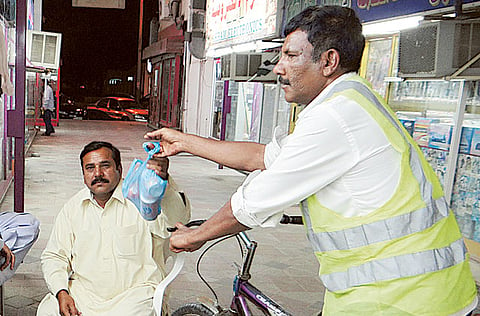Fluorescent jackets a must for cyclists in Al Ain
New measure evokes mixed reactions among cyclists

Al Ain: Want to ride a bicycle on Al Ain streets?
Better wear a fluorescent jacket. The new measure recently adopted by the traffic police to enhance cyclists’ safety in the town is now mandatory.
The jackets make cyclists highly visible when they pedal through streets alongside the high speed vehicular traffic. The jackets have recently been made mandatory for all cyclists in Al Ain and police believe that motorists can now easily spot them thus reducing chances of accidents.
An official of the city’s traffic police said fluorescent jackets make cyclists more visible on the streets and the measure has been taken for the safety and protection of the cyclists especially at night.
“Reflective panels and high visibility strips or straps on jackets can keep you safe and visible on the roads especially early in the morning and at night,” he said.
The rule is being following by all cyclists including children, joy riders, and employees of restaurants, groceries, maintenance and other services. The downtown Al Ain is being promoted as ‘pedestrian friendly’ by Al Ain Municipality but has no dedicated cycling paths. Cyclists ride on narrow pavements, alongside the vehicular traffic on busy streets, or in the lanes of residential areas.
The measure has also generated a high demand for jackets in the market and the prices have gone up from the previous Dh5 to Dh10. In some cases, people have also reported that they were charged Dh15 for a jacket by some shopkeepers.
The measure has evoked mixed reactions among cycling enthusiasts.
“It’s not fair to force cyclists to wear fluorescent jackets,” said David Miller, an expatriate resident. He said it would discourage people riding bicycles by giving an innate message that bikes were potentially dangerous.
Miller said traffic authorities should take drastic measures concerning speed and reckless driving if they want to reduce mishaps on the roads. “They should not give an impression that cycling is dangerous,” he said, noting that police have repeatedly discouraged cycling in the city through different campaigns in the past.
Ibrar Hussain, another expatriate, said: “In a country that has a high obesity rate and lethargic lifestyle, cycling can help people to stay healthy and active.”
He feared the rule of fluorescent jackets will ultimately discourage people from riding cycles in the city.
Joy Fernando, another Al Ain resident, said he was surprised to see bicycle riders wearing yellow fluorescent jackets.
“At first, I thought construction workers or cleaning staff of some company were riding bicycles, but my son told me that all cyclists have to wear this jacket whether they ride in the day or at night,” he said.
The high-visibility jackets, he said, have been giving an impression that cycling is inherently unsafe and actually a sort of combat on Al Ain streets that needs some kind of specialist pursuit. He was equally surprised to read about a recent Dubai police’s ‘Cross the Road Safely’ campaign under which the traffic department in cooperation with Naif Police station have been distributing fluorescent jackets for labourers.
The jackets have been given to different companies in order to distribute them among their workers and encourage them to wear jackets when they go out at night. The move aims at reducing the number of pedestrian accidents.
“Is is not weird?” said Fernando, noting that pedestrians are not only the labourers. “What about others? Should they also wear fluorescent jackets?
Sign up for the Daily Briefing
Get the latest news and updates straight to your inbox


